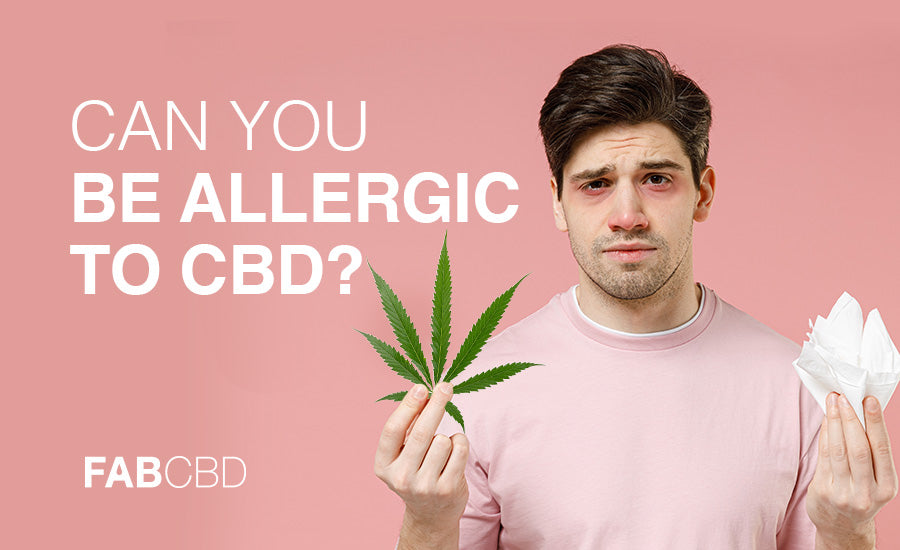
Can You Be Allergic to CBD?
In the U.S., allergies rank as the sixth leading cause of chronic illness, affecting over 50 million Americans annually, according to the American College of Allergy, Asthma and Immunology. With an astounding annual cost surpassing $18 billion and more than 50 million Americans suffering from allergies each year, it's no wonder many are curious about potential allergens, including the trending topic of CBD.
Dive in as we explore the question: can you be allergic to CBD, and what does that mean for your journey to overall wellness?
What is an Allergy?
An allergy is the immune system's response to substances it perceives as foreign invaders, even if they're not harmful. Common culprits include pollen, pet dander, certain medications, and foods like peanuts and shellfish. When confronted with these allergens, the immune system releases antibodies.
These antibodies trigger the release of inflammatory chemicals, leading to allergy symptoms. Whether it's itching, a runny nose, or more severe reactions, understanding allergies is crucial, especially when navigating the world of CBD and overall wellness.
Can You Be Allergic to CBD?
The Rarity of CBD Allergies
While it's uncommon, some individuals might experience an allergic reaction to CBD or the cannabis plant. It's essential to differentiate between an actual CBD/ cannabis allergy and the mild side effects that can sometimes mimic allergy symptoms.
Cannabis and Pollen Allergens
Cannabis, like many plants, produces pollen. This pollen can be a trigger for allergic reactions, especially in those who are sensitive. However, CBD oil undergoes a refining process that typically separates the CBD from these pollen allergens, making it less likely to cause a reaction.
Variability in CBD Products
The market is flooded with many CBD products, each with its unique composition. While CBD might not be the allergen, other ingredients in these products could be. For instance, some CBD products, especially low-quality ones, might contain residual solvents, pesticides, and other chemicals. These impurities can lead to adverse reactions, which can be mistaken for allergies.
Terpenes and Irritation
CBD products often boast a mix of terpenes, which are aromatic compounds found in many plants, including cannabis. While terpenes can enhance the overall wellness experience for many, they can also irritate some users. For those sensitive to terpenes, opting for a CBD isolate, which offers cannabidiol in its purest form, might be a better choice.
So, while CBD allergies are rare, being informed and cautious is crucial. Always opt for high-quality CBD products and consult with a healthcare professional if you're unsure about potential reactions.

CBD Allergies vs. Side Effects
Understanding the Difference
It's essential to differentiate between CBD allergies and side effects. While both can manifest after using CBD products, their origins and manifestations can vary.
Side Effects of CBD
A minority of CBD users might experience side effects, though they're relatively rare. Some of these side effects include drowsiness, fatigue, dizziness, and changes in appetite. It's crucial to note that these aren't necessarily indicative of an allergic reaction to cannabidiol but rather how one's body might react.
Allergic Reactions to CBD
On the other hand, genuine allergic reactions to CBD are different. Symptoms like hives, itchy skin, sneezing, a runny nose, and sometimes difficulty breathing might indicate an allergy. If someone suspects they're having an allergic reaction or experiences adverse reactions, it's advisable to stop using the product.
Tips for First-Time CBD Users Concerned About Allergies
Opt for High-Quality Products
Choosing a high-quality CBD oil or product from a trustworthy brand can make all the difference. Top-of-the-line products ensure minimal residual ingredients, reducing the risk of allergic reactions.
Start Low and Slow
For those new to CBD, it's wise to begin with a modest dosage. This approach helps gauge CBD's effect on your body and minimizes potential allergic reactions. Over time, you can gradually increase the dosage to achieve the desired effect for overall wellness.
Consider CBD Isolate
CBD isolate might be the way to go if you're concerned about potential allergens. Being 99% pure CBD, it's less likely to contain terpenes or other compounds that could trigger allergies.
Pause and Assess
Our daily routines expose us to a myriad of potential allergens. If you suspect CBD might be causing a reaction, consider pausing its use. If reactions persist even after a break, other factors in your routine might be the culprit.
CBD and Allergies: The Final Verdict
While allergic reactions to CBD are indeed rare, they can occur. Often, the culprit isn't the cannabinoid but other low-quality CBD products' ingredients.
These products might contain higher levels of non-cannabinoid allergens, complicating the identification of the actual cause of a reaction. As you navigate your overall wellness path, choosing high-quality products is crucial. For a trusted source, explore Fab CBD's range of products.
















